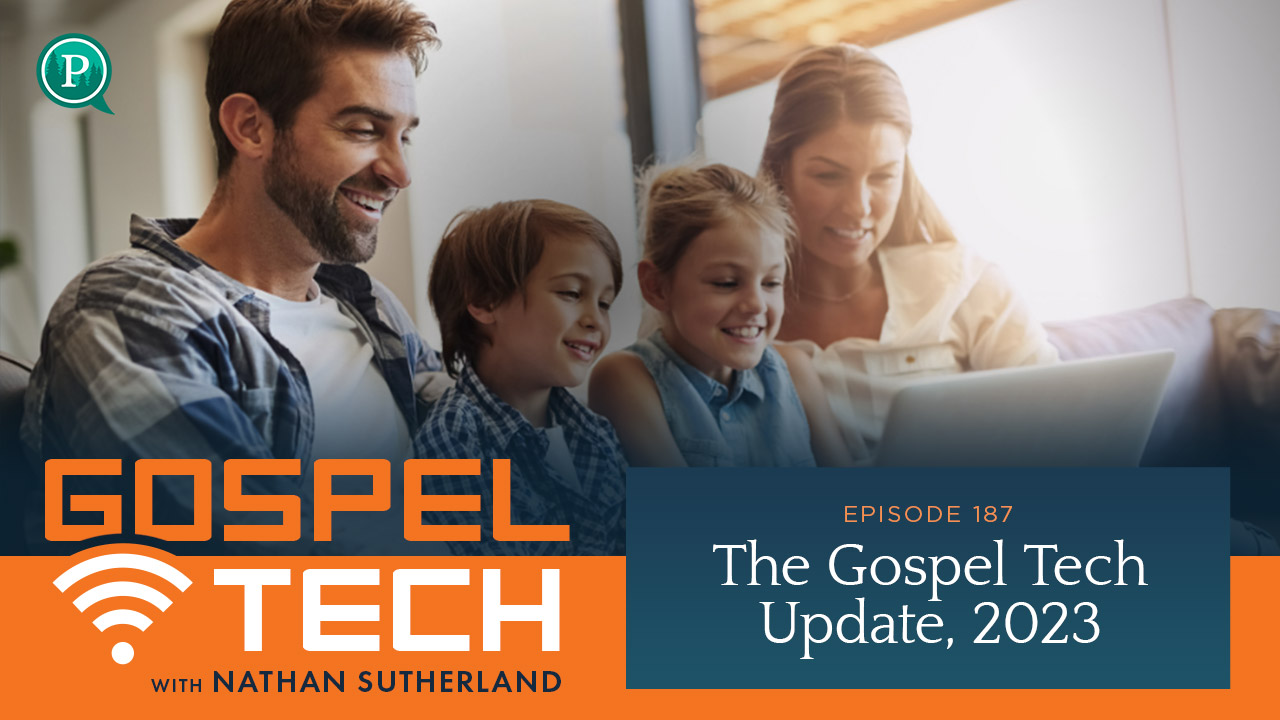This past year we have grown faster than we ever dared dream, and I want to take the chance to share what God has done in 2022, our vision for 2023, and how you can join us on this journey to help families love God and use tech.
Transcription:
Nathan Sutherland:
Heavenly Father, thank you for this chance to talk today about Flint and Iron and Gospel Tech and this ministry you’ve given me to do. I ask that you would give me clarity with my words and that you would be glorified, Lord, in the process of what we have done and what we are asking people to join us on to do. In Your name, amen.
Hello everyone and welcome to the Gospel Tech podcast. My name is Nathan Sutherland and this podcast is dedicated to helping families love God and use tech.
Today we’re taking a quick intermission from that three-part series about talking about preparing our tech for the fall in order to have this conversation about how do we look at the ministry of gospel tech in its context of where we’ve been and where we’re going. So, today is the fundraiser 2023, if you will, talk. Not in that I’m expecting anyone listening this to give. Instead, I use the fundraiser, if you’re not familiar with what we do, we have basically a big backyard picnic. It started five years ago when my two younger sisters suggested, “How are you going to fund this?” And I was like, “Well, I don’t know. COVID.” And they’re like, “You should do a fundraiser.” So, we started doing the fundraiser.
Now, most people who support us, support us because they’ve prayed about it and they want to, so the fundraiser itself is a chance to celebrate what God’s doing. So this conversation, is… It’s podcast version. There’s also a video version you might be watching right now. This is about celebrating what God has done, reminding us God’s goodness from this past year and then talking about, “Okay, now where does this lead in this coming year?” And that’s really the goal of today’s conversation, is bring everyone up to speed. You might be new to gospel tech in this ministry. You might be old hat and have been with us for all five years of this journey. Thank you for being here.
That is today’s goal, is having this conversation, really three parts, about what has this last year looked like? What did God do in 2022? What is our vision for 2023 and how can you join us with a little context around what is this ministry just as an entity in itself? So, that’s where we’re headed today. With no further ado, let’s get this conversation started.
Welcome To the Gospel Tech Podcast, a resource for parents who feel overwhelmed and outpaced as they raise healthy youth in a tech world. As an educator, parent and tech user, I want to equip parents with the tools, resources, and confidence they need to raise kids who love God and use tech.
Thank you to everyone who has helped make this podcast possible. Thank you for listening, for sharing, for liking and subscribing. Thank you for donating, because this work is part of a nonprofit and this is how we let other people know what we are doing and provide resources to families all over the United States, but also all over the world, and it is such a blessing to be able to do that.
A little context if you are new to gospel tech or to Flint and Iron, here’s the story of how we got here.
I was a middle school teacher in Washington state on the west coast of the United States, and I in my journey of teaching was convicted that my passion for seeing young people reach their full potential extended beyond the classroom. I was actually more passionate about having conversations about choices and purpose and making mistakes doesn’t make you a mistake, that I really needed to actually step away from teaching.
So, I stepped out of the classroom for the same reason I stepped into the classroom, which was to see kids reach their full potential. I love that about teaching and given the opportunity, I would go back if I wasn’t being called somewhere else. So, maybe one day when everyone already understand this healthy tech conversation, I’ll go back and do that. But for now, my teaching is in a different avenue.
In 2016, I started Flint and Iron, a nonprofit specifically focused on sparking positive purpose in youth, and I taught in the afternoons. I ran nonprofit in the morning and I cut my teeth on this bootstrapping process of, “How do you start a website? How do you start a nonprofit? How do you raise funds? How do you communicate an idea? How do you convince other individuals that this is a worthwhile idea?” Because people buy into the concept of education. It’s well done over the last couple thousand years that education’s important and it opens people’s minds to what God has done in their hearts and in their lives and empowers them to pursue all that God has called them to be and we believe in that.
Sometimes nonprofit work is more difficult, so I did that for three years. By 2019, Anna and I had prayed through it. I had a wonderful mentor, Dr. Scott Rodin and my incredible board, and they helped me see that, you know what? God’s equipped me for this particular task right now. Maybe not forever, but right now, this process of reaching young people directly instead of through a classroom and so I stepped out of the classroom in June, 2019.
At that same time, I was heavily, heavily convicted that the gospel has to be part of this conversation. It actually came through this… What I thought was going to be this pinnacle moment in my speaking career.
I had five talks in a day all over Eastern Washington state and I was pumped. I took a buddy with me to do some video stuff, another board member friend to just come be a part of the process and give me feedback. We did these five talks and we drove back that night and I taught the next morning. And on my way back home, I just had this, “Oh no experience” realizing I can’t without any other context, without 180 days of school to be with these kids, I can’t just show up and tell them how to fix their poor choices, because at the end of the day, I’m just delivering the Old Testament. Like, “Oh, you want a good life? Great. Here’s a bunch of stuff you’ll never be able to do in your own strength. Go get them, tiger.” It’s not going to work like, “Oh, you want a good life? Just don’t mess up and your life will be great.”
And then I walk out and they clap for that and I get paid for that? I’m not okay with that being my 180 days of speaking a year. And so Gospel Tech was born and in fact, that first fundraiser, I stood up in front of maybe 50 people and said, “Hey, here’s what we’re going to do. We’re going to go speak Flint and Iron, Purpose and Youth. We’re still going to do that, but we have this other ministry. It’s going to be technology. It’s going to be something about the gospel. I don’t have any resources. I don’t have a podcast. I don’t even have a name for it. Would you join us?” And they did. And I went for a walk with Anna the next day and I was like, “Isn’t that encouraging that people did this?” She’s like, “No, why did they give us money? What are we going to do now that we’re on the hook for this idea?” And that’s when it hit me. I was like, “Oh yeah, a year from now they’re going to want something.”
There is this temptation to start forcing things, especially in ministry of like, “Oh, we got to do stuff now to prove that we are…” I don’t know, good enough or impressive enough or worth the investment. I don’t exactly know what it was, but it’s there. It’s this real weight, and if you’re in ministry, you may have felt this. And so the next year was praying into, “Alright, Lord, we’re not here to impress these people, but we do want to be faithful with what we’ve been given. We’ve been given this chance.” And so this next year we did it and we had a podcast. Actually the podcast launched February, 2020 and I found it this last week and it was like, “Hey, podcast is live. The thing’s called Gospel Tech.” And three weeks later, the world shuts down. We’re like, “Oh, that’s rough.”
Sure enough, three years later, what we got is we have a ministry called Flint and Iron. It’s public schools and public organizations talking about hope and talking about choices, potential, and purpose. That’s what that does all the time.
The other side is Gospel Tech, and this is aimed at Christian churches and schools and the conversation here is, “How do we love God and use tech? How do we use our technology from the hope we have in the gospel? So, I am a new creation, so when I go to technology, I should use it on purpose, not for purpose.” That’s gospel tech.
Both of them are… They’re extensions of this Flint and Iron nonprofit. The greater focus in all of this is to see young people reach their full potential and so that’s how the two organizations work. That’s how we got to the spot in 2023 that we are in today where we just finished the biggest year ever.
Looking back, I said, “I want to talk about 2022, vision for ’23, and then how you can join us.” In 2022, we grew. Grew really fast, and it’s exciting. Sometimes we grew a little too fast. In March of this last year, I gave more talks than I did all of last year. It was way too many talks. I talked like three quarters of the days that month. And then I quickly realized, “Oh, we are growing, but more talks isn’t our goal.” Our goal is to do God’s will and part of God’s will is for me to love my wife well and to be a great dad and to be present, certainly to fund this nonprofit and make sure that we stay above water, but I’m not going to do that well if my life is falling apart, if I’m spiritually burned out.
So, we set a new schedule and we grew into that, and now we have talks booked. If you’ve listened. As you’ve heard, September, October are full. November I’ve got some weekdays, but no weekends. My first weekends are in January that I can speak now, and actually I only have one left. And then it’s February and that’s great, but that kind of growth demands a certain amount of structure. And so workshops took off. I do… Well, I’ll talk about my workshops in a minute, but I do two main workshops for parents and a workshop for youth as part of gospel tech, as we try to frame this.
The Flint and Iron side, I’m not advertising that, but schools are coming and asking. Some of the cities around where I live are saying, “Hey, do you speak to leadership organizations and to young people?” And so we’re getting those opportunities and word of mouth spreads on the Flint and Iron side, I had spoken to the leadership thing, got an email from a high school counselor saying, “Hey, students came back from that, said, we need to bring you in.” So I showed up and the teacher, or the counselor said, “Hey, you’re heading into this assembly. Just know if they’re not seniors, this is the first all school assembly they’ve ever had.” School of 1,800 kids. This is a 4A school in Washington State. And I was like, “Alright, that’s interesting.” She’s like, “If they are seniors, they’ve had one other one, but because of COVID, we’ve only done grade level or we just haven’t done them.”
Then I walk into the room, get introduced by these two students who had told the counselor they need to bring me in and the entire introduction consisted of, “This is Nathan. He’s amazing.” And then handed me the microphone. I was like, “Oh, definitely overselling my abilities. But thanks.”
And it was cool. I got to share over the next 45 minutes a message of hope. The premise of the hope conversation is that making a mistake doesn’t make you a mistake. I start the conversation by saying, “I’m going to assume you’ve done things that are wrong on purpose. So now what?” I don’t want to come in and simply say, “Have a good life by just never making a mistake.” There are certainly easier choices and roads to pick, but at the end of the day, not making mistakes isn’t our goal. Our goal is be made new creations. Right? I can’t say those exact words in a public school, but I can get there with the exact same hope of recognizing you have a need, there must be a solution, you’ve got a purpose in the process. Your purpose isn’t a ship that sails And if you miss it, tough luck. It’s a path you walk and you can always get back to it. And that’s the premise of the public school talk.
Whereas on the Gospel Tech side, this past year when we’re growing, my single 70-minute talk on technology, expanded to two 70-minute talks. That’s now become two 90-minute talks with a 30-minute Q & A that I present to parents. The first one, the big three: smartphones, video games, pornography. The second one: making tech safe at home, and between those two, we have a full conversation on how do we raise up kids who love God and use tech. And then I also speak directly to kids about using tech on purpose, not for purpose.
That’s 2022. We’ve grown. I’m speaking. The podcast has doubled in size. We’ve partnered with amazing organizations like Christian Ministries here on the West coast who helps us with the purposely podcast network, get our word out to more individuals so they can hear the gospel and have tools to talk about technology. That’s amazing. We partnered with Christian schools and with churches and organizations like Mothers of Preschoolers, MOPS, like Communities in schools like the YMCA, to partner with a local school district to bring this message of hope to parents who wouldn’t walk into a church, but still need support. So, that’s how we’ve grown this last year, and it’s awesome.
Then we look at 2023 and go, “Okay, well what’s the goal? Certainly keep the schedule full,” like I mentioned. Going into January, cool, that’s great. But staying busy isn’t the goal. Reaching families with hope and help is empowering parents for those tech wins. That’s a goal. So how do we do it? Workshops are still happening. Podcast is still growing. We’re growing our team. We’re going to bring on an admin person, someone to handle details like booking trips because those details crush me, or managing some of the requests for speaking. It’s a process we’re excited to get… Be more consistent, because right now it’s on my plate. And then marketing. We have three things we want families to know. We want every family to understand tool and rule tech, that there’s a difference between tech that helps you create and tech that helps you consume. We want every family to know the reset, to be able to assess quickly, instantly, “Is this tech helping my child or is it hindering them?” And then to understand how to build a hedge. We need to get it in front of families more and I am not a digital artist. I’m not a creative on that side. I made the ideas and I can speak them. We are excited to bring a team on, and the funding from this fundraiser is going to help us do that.
We are also continue to expand where we speak. We’re now California to Pennsylvania, to Eastern Washington and some potential international stuff. We’re working that into the schedule. The how to do that well and faithfully, not in order to get feathers in our caps, but in order to reach individuals who are hungry for this and organizations that are supporting these conversations already, because we have some words that can really help that go to the next level and help churches serve families that they’re already loving well.
Then the third and final is there is in fact a book. I’ve said this before, but it’s official. The rough drafts have been sent. They’re in editing now. There’s going to be about a hundred-page Gospel Tech book, and it’s simply Gospel Tech, love God, use tech. So you come and listen to one of my talks and you go, “Man, my uncle, my aunt, my mom, my dad, my husband, my wife, my kids, my,” whoever, “needs to hear this.” Well, you could send them to the two-hour YouTube recording of it, but that’s a big ask. Two hours, you could read this a hundred-page document, because it’s pretty concise. It’s intended to be.
That was brought along by donor support, allowing us to purchase this process of buying some of the books to be able to have on hand and be able to give away when people can’t afford them. That’s incredible. And the time in order which to write it has been amazing. So, thank you to everyone who’s helped make that process possible. The Gospel Tech book is a thing, and it hopefully will come out… Well, it’s coming out. Our timeline right now is early 2024, and we’ll do a kickoff for that.
But that is this next year. Workshops are still happening. Partnerships are still happening. I mentioned some of that. The YMCA, Christian ministries, local churches and schools as well as those across the country. And then continuing to grow the, pod… I mentioned the podcast. The book is the third resource. And so really excited for where this is headed, which brings us to, “Alright, we know what gospel tech does.”
Oh right, 2023, on the Flint and Iron side, we are still doing public focused and facing talks. That is an area absolutely of growth that we are seeing, and there’s some really cool things in the works with local school districts, and I’ll just toss it out there. If you guys have a school district, every time I do one of these talks in a church, I am now encouraging those churches, “Hey, invite your local schools. Connect with communities and schools. Connect with your local YMCA. Connect with anyone in the area that serves other people, because absolutely you can serve your community.” Yeah, they’re going to hear the gospel. That’s not bad either. And there’s still a lot they can take away from this. Even if they don’t have the groundwork of a faith in Jesus Christ yet, they can still take away, “Yeah, I love my kid. Yeah, I want to serve them well. Yeah, I want to parent out of hope, not fear. I don’t just want to say ‘tech bad or tech, eh, do whatever you want.'”
We want to be intentional and loving, and those are all parts of reflecting who God’s called us to be as parents. So, please bring me in and let’s team with whoever in your community is hungry to see young people reach their potential. Which brings us to, “How can you join us on this journey?” The first is pray. Yes, we can make plans. Yes, we can have great resources. If the Lord does not make it happen, it’s not going to happen. We can plant all the seeds we want and water them as much as we want, but the Lord’s got to make them grow. We can’t just sit there and yell at them to do better, so please pray. The Lord’s been opening doors and we’ve seen that and it’s humbling and awesome, so thank you for supporting us in that way.
The second is connect us. And this has already happened. I’ve mentioned this to people and they’re like, “Oh, actually, I’ve got a guy.” Awesome. “I have a lady or a group.” Every single talk I’ve had has come through a connection. I am still 0% on my cold calls. All the work we had this past year and ended this coming year is because someone heard of us or heard us talk and invited us in or connected us with a friend. So, if you can think of an organization, an individual, a group who needs these resources, connect me with them. I would love to talk about what that could look like. And that can be just as much as there’s a brother or sister who’s in a similar ministry. They’re working in a similar vein. I would love to have that conversation. And just even if it leaves with we pray together and we go knowing there’s one other person doing this work, reaching families, super cool. Please connect me with them. I would love to be a part of that.
But there’s always these chances that, maybe there’s something that hits off in a different vein and the Lord does something in their heart or in my heart that allows future work, so connect us with those resources and opportunities that is an awesome opportunity. Or excuse me, an awesome way to serve and join us in this journey.
the third is to financially support us. Donate to Flint and Iron and to Gospel Tech. They are one organization, so from the IRS, it’s Flint and Iron. It’s a DBA basically right now, for gospel tech supporting the mission of sparking purpose in youth. And it is a 501c3 nonprofit. All of our work is going into this focus of how do we support families? How do we equip young people? And right now we’re equipping them by equipping the leaders and the parents and the adults around them to be able to have these conversations as well as talking directly to young people. So, that is amazing. It allows this work to happen and allows us to go to organizations who can’t pay for it.
I started smiling because at the fundraiser, two people talked. A PTA President and a leader of MOPS, and the leader of MOPS specifically said, “Thank you all for giving,” because we paid him a $20 gift card. And I don’t know if this strikes a chord with you, but if all I did was speak with $20 gift cards and didn’t have any donations, I wouldn’t be able to do this full time. I wouldn’t be able to travel to the places I travel for the amount people can pay. So support allows us to run the podcast to create the written resources, to give talks. When every time I write, I say, “Hey, here’s our cost and if this doesn’t work for your organization, just know we are donor supported. We want to make this happen.” And so thank you to those donors who have made this possible with the finances God’s given you that you’ve blessed us with.
We have a full-time bookkeeper. That is something we are very intentional with to make sure that every dollar is tracked and is followed to make sure that this money is accountable, to make sure this money is going to the ministry, and it’s doing the work that we’ve committed it to do, and sparking purpose in youth and helping families love God and use tech.
That is how you can join us. That’s what Gospel Tech is up to this year. Thank you for supporting and being on this journey with us and if you have any questions, you can reach out to me directly, [email protected]. Or you can find us on social media, Facebook, and Instagram. We’re @LoveGodUseTech, and you can join us next time as we continue this conversation, both about how we can prep our tech for fall, but how we can continue to raise up kids who love God and use tech.
Follow this podcast:







